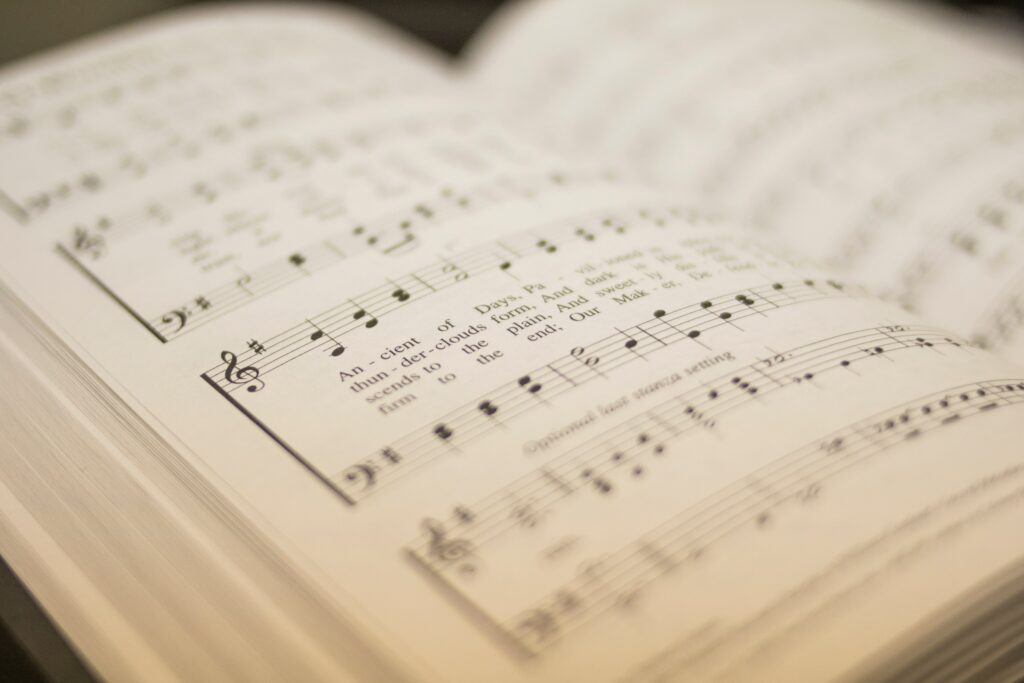
Part 1: Introduction | Part 2: Christ As Firstborn
Our hymns typically have stanzas. The hymn in Philippians 2 does as well. The stanzas are easy to spot,* because the phrasing is parallel, and the content progresses from “down” to “up”:
- 6 who, although He existed in the form of God,
- did not regard equality with God a thing to be grasped, 7 but emptied Himself,
- taking the form of a bond-servant, and being made in the likeness of men.
- did not regard equality with God a thing to be grasped, 7 but emptied Himself,
- 8 Being found in appearance as a man,
- He humbled Himself
- by becoming obedient to the point of death, even death on a cross.
- He humbled Himself
- 9 For this reason also, God highly exalted Him, and bestowed on Him the name which is above every name,
- 10 so that at the name of Jesus every knee will bow, of those who are in heaven and on earth and under the earth,
- 11 and that every tongue will confess that Jesus Christ is Lord, to the glory of God the Father (Php 2).
The first hymn in our series celebrated Christ’s sufficiency to rule. This second hymn celebrates his humility as demonstrating his qualification to rule. The first stanza notes his humiliation; the second, his exaltation.
Note that it all begins with a relative pronoun, which is one of the suggested identifying characteristics of hymnic material in the NT text. Then comes a note of surprise, indicated by the “although”: “Even though he was exactly the same shape as God, he didn’t cling to what he had, but he emptied himself!”
This is surprising for a couple of reasons:
- What it means to be “in the form of God”
- What one would expect from such an exalted person
In English, “he was in the form of God” implies uncertainty, even fraud: “he looked like so-and-so, but he actually wasn’t.”
There’s none of that in the Greek. The word is morphe, or “shape.” Paul says Jesus is exactly the same “shape” as God. Since God has no body, we’re clearly not talking about physical shape or appearances. Jesus is like God in all of his non-physical qualities—his personhood, his characteristics or attributes, his perfections.
If some of God’s attributes are unique to him (we call those “incommunicable” attributes), and Jesus is exactly like him in those respects, then what is the only logical conclusion?
Jesus is God.
And what would one expect from such a person?
If the kings of the earth exalt themselves—ancient monarchs, and even the much more recent Hirohito, were viewed as gods—then why would the genuine God humble himself?!
Surprising, indeed.
And how, specifically, did he humble himself?
He became a mere human.
And not a very distinguished one, at that. A subject of Rome, in a backwater village in a backwater province, son of a manual laborer, with people asking questions about the circumstances of his conception (Jn 8.41).
And then, he intentionally took a path to execution as a common criminal, by the most torturous means ever devised.
You can’t get any lower than that.
And now for the big surprise.
God reaches down to the depths, to the bottom of the barrel, and raises him up, not merely to exoneration, or even to elevated human status, after the fashion of Joseph in Egypt. Not even to revelation of the Father’s approval, or of his heavenly origins.
No. All the way. All the way to the top. To the name that is above every name.
To the point where his Roman executioners, and the corrupt Jewish leadership, will bow to him.
And not just the corrupt ones. Everyone. Those despised, and those deeply admired. All humans will bow.
And not just humans. Demonic powers. And angelic ones, too. All of heaven. All of hell.
They—no, we—all will bow, and we all will agree that this one is Lord. Lord of us, Lord of all.
Those who now deny God. Those who hate him. Those who question him, because they have suffered greatly in this life. Those who have simply ignored him as inconsequential.
We all will bow to the one who, though he is God, humbled himself.
Sing of him. Sing of his marvelous works.
Sing it in private and in public. Sing it to those you love, and to those you don’t. Make it what everyone who knows you thinks of when they think of you.
Sing.
* For a slightly different look at the structure, see here.
Part 4: Morning Light | Part 5: Manifested, Vindicated | Part 6: Eternal Glory | Part 7: If and Then | Part 8: God and Us
Photo by Michael Maasen on Unsplash

